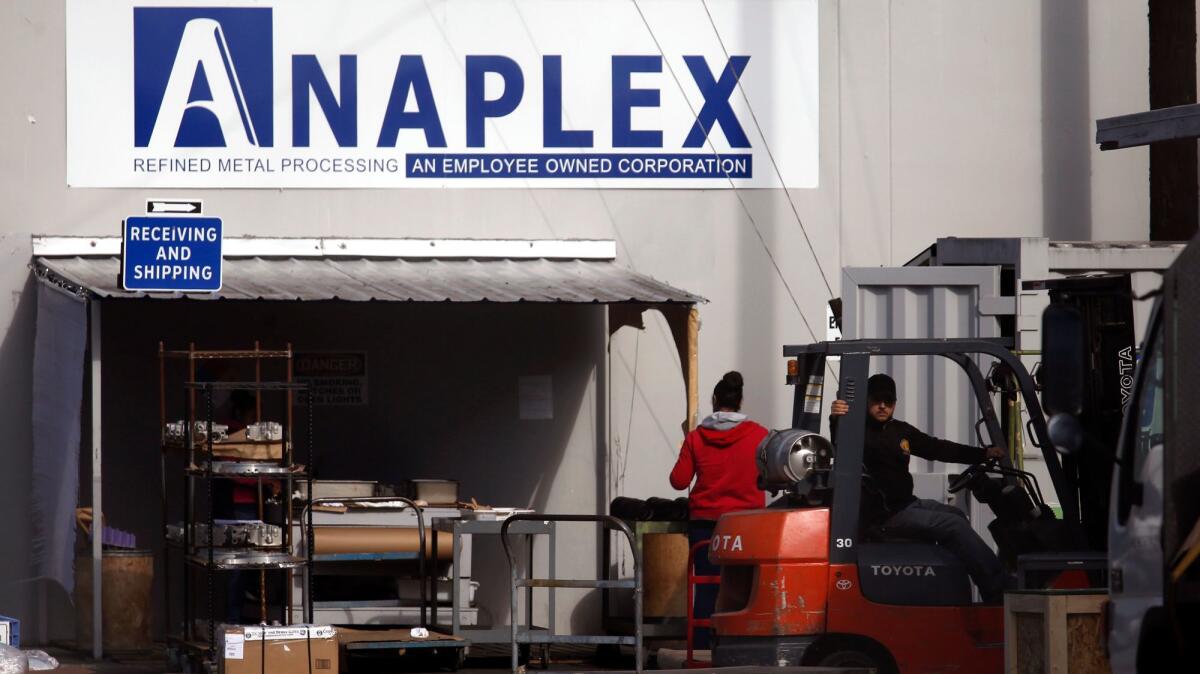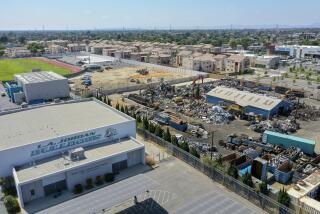Health officials order Paramount metal plants to stop emissions or suspend operations

In a rare intervention, county health officials Thursday ordered two Paramount metal-processing plants to stop emissions of hexavalent chromium or shut down operations contributing to high levels of the cancer-causing air pollutant.
The Los Angeles County Department of Public Health directed Aerocraft Heat Treating Co. and Anaplex Corp. to “immediately take all necessary actions to eliminate the current nuisance endangering the health of the public, which may include full or partial suspension of operations.”
The orders come two days after the facilities in the city southeast of Los Angeles were targeted with enforcement action by air quality regulators. The South Coast Air Quality Management District filed Tuesday for an administrative order to force the facilities to halt their emissions or shut down, accusing them of exposing Paramount residents to high cancer risks.
Taken together, the moves mark a significant escalation by agencies that have been criticized by residents for slow and weak action in addressing longstanding health concerns over pollution from metal plants operating close to homes and schools.
Regulators began studying metal pollution in the working-class community several years ago but have not delivered on promises of new emissions rules to protect residents. And until recently, most efforts had focused on only one metal plant in a city with dozens.
Then in late October, air monitoring found a hot spot of hexavalent chromium at more than 350 times normal levels — among the highest concentrations recorded in the region. Hexavalent chromium, also called Chromium 6, is a known human carcinogen linked to lung cancer.
It was a troubling validation for residents in the mostly Latino city of 55,000, who have complained for years about harsh metallic fumes. The city is home to an array of metal platers, finishing shops and forges that service aerospace, defense and other industries.
The alarming measurements forced air quality officials to expand their investigation. They pledged to find and fix problems, calling it their highest priority. In the weeks that followed, inspectors from several agencies joined forces, fanning across some two dozen facilities in the the city’s industrial spine in search of companies that were responsible.
The directives hand-delivered Thursday by the county give Aerocraft and Anaplex 24 hours to notify the health department of their intent to comply and submit a list of actions taken and proposed to stop the threat to the public.
The orders seek to “bring the facilities into compliance or shut down the processes that are responsible” for the excess emissions, said Angelo Bellomo, a deputy director for the health department.
Anaplex spokesman Adán Ortega said Thursday that the company had reviewed the health department’s directive and will respond.
“Anaplex takes these allegations very seriously and is looking to make corrective actions wherever necessary,” Ortega said.
Aerocraft did not respond to requests for comment Thursday.
In previous comments, however, an Aerocraft spokeswoman has said the company is reviewing its processes, cooperating with investigators and “will take necessary actions to resolve any issues.”
Such directives are rarely used.
The last one issued by the department was in response to the Aliso Canyon gas leak in the fall of 2015, which ordered Southern California Gas Co. to stop the gas release and relocate thousands of Porter Ranch residents.
Bellomo said the health department has not decided whether relocation will be necessary in Paramount, where residents live as close as a block from where the hexavalent chromium hot spot was detected.
Both facilities targeted this week have operated in the city for decades — and Anaplex has been in trouble before.
The air district cited Anaplex in April for violations involving the use of primers containing chromium, records show.
Last year, Anaplex agreed to pay a $142,200 penalty to settle hazardous waste and water pollution violations stemming from a years-long investigation by the U.S. Environmental Protection Agency. A 2010 inspection by the agency found the company failed to treat its wastewater for toxic metals, including cadmium, chromium and nickel.
Ortega, the Anaplex spokesman, said that previous complaints from local and federal pollution regulators had been resolved, and that the latest air quality issues “were brought to our attention” only after an inspection in mid-November.
Bellomo said officials do not want pollution problems in Paramount to linger as they have elsewhere, citing “lots of cases where non-compliant operators have continued to operate for years and decades.”
“So this is going to be a full-court press — AQMD and public health together bringing a rapid abatement of this hazard,” he said.
The recent orders were welcomed by community groups and environmentalists who have fought for more aggressive action on metal pollution in Paramount.
“We are encouraged,” said Robina Suwol, who directs the environmental health advocacy group California Safe Schools. “But there is still much to be done to protect this extremely vulnerable community.”
Twitter: @tonybarboza
UPDATES:
8:25 p.m.: This article was updated with additional details and with new comments from an Anaplex spokesman and environmentalists.
3:24 p.m.: This article was updated with additional details on Anaplex and with previous comments from that company and Aerocraft.
This article was originally published at 2:45 p.m
More to Read
Sign up for Essential California
The most important California stories and recommendations in your inbox every morning.
You may occasionally receive promotional content from the Los Angeles Times.











